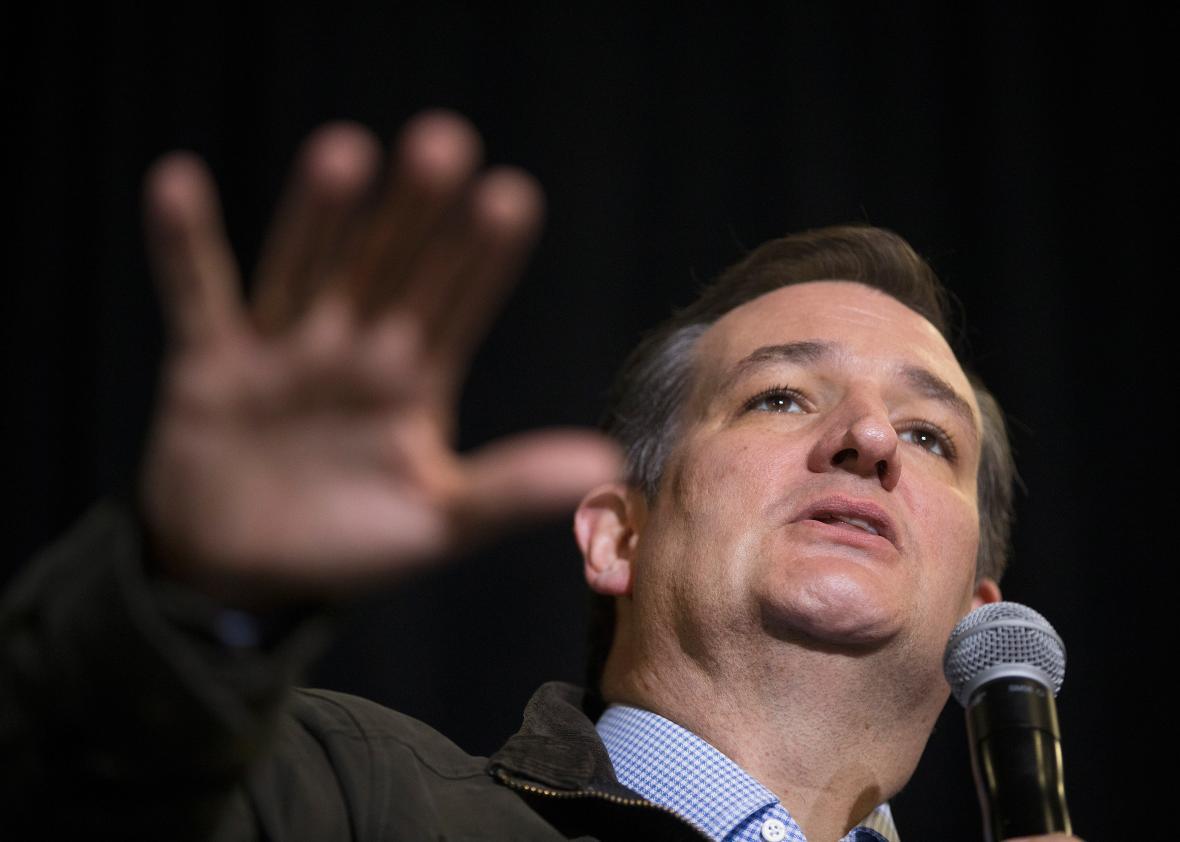And we’re back. It’s been 10 days since the latest Democratic nominating contest and two long weeks since the latest Republican one, but the delegate-awarding drought ends Tuesday in Wisconsin, where the latest polling suggests both parties’ front-runners appear headed for defeat. The question, though, is whether primary victories by Bernie Sanders and Ted Cruz Tuesday night would reset their respective races, or simply pause them ahead of the big-ticket prizes that come later this month. Let’s take a closer look.
The Basics
The GOP primary is a winner-take-most affair, with 18 delegates awarded to the winner of the statewide vote, and three to the winner of each of the state’s eight congressional districts. Wisconsin Democrats, meanwhile, will dole out 86 pledged delegates proportionally based on the statewide vote. Voting ends at 9 p.m. ET across the state.
The GOP
Polls suggest that Republicans desperate to deny Trump the nomination will have reason to cheer when the final results come in Tuesday night. Ted Cruz leads the celebrity billionaire by an average of more than 4 points in recent statewide polling, and Nate Silver’s FiveThirtyEight pegs the Texan’s chances of victory at 91 percent based on a combination of those polls, national surveys, and endorsements. Depending on how the district-level vote breaks down, it’s even possible—though not probable—that Trump could place a relatively strong second and still leave the Badger State with zero delegates if he loses to Cruz in the state’s more conservative districts and to John Kasich in the state’s most liberal one, which is home to Madison and the University of Wisconsin.
Even if Trump avoids that worst-case scenario, though, he’ll still be in trouble if he loses Wisconsin. His path to the 1,237 delegates needed to win the nomination is already narrower than you might think given his collection of state victories. Based on the current Associated Press estimates, Trump needs to win roughly 54 percent of the remaining delegates to hit the magic number before the convention. To date, though, he’s won only 48 percent of those that have been bound. Regardless of what happens Tuesday night, he’ll still be the overwhelming favorite to arrive in Cleveland with the most delegates—but a plurality won’t be enough to win a contested convention, at which his delegate advantage could disappear after the first ballot.
Compounding Trump’s problems is that a loss in Wisconsin would come on the heels of one of the roughest weeks of his campaign, which would provide plenty of fodder for those pundits and political prognosticators who believe the end of Trump is finally upon us. In reality, though, Tuesday night’s results may be more about demographics than momentum. Given the particular makeup of Wisconsin’s GOP electorate—a somewhat unusual mix of voters who skew more educated and more religious—the state was always going to be unfriendly territory for Trump. Toss in local conservative talk radio, which has been united against him, and a popular sitting governor who endorsed Cruz, and a Trump loss by itself won’t tell us all that much about the future. That said, if he finishes far short of the 35 percent or so he’s been polling at recently, that would be a sign that the GOP front-runner’s recent stumbles have indeed taken a toll.
The Democrats
Bernie Sanders is on something of a hot streak of late. He’s won five of the past six Democratic nominating contests, and could very well claim another victory Tuesday night. The Vermont senator leads Hillary Clinton by an average of nearly 3 points in the most recent state polls, and Nate Silver’s FiveThirtyEight pegs his chances of victory at 73 percent in Tuesday’s contest.
His recent statewide victories, though, obscure the fact that he’s still way behind in the all-important delegate race. Consider: Despite his near-sweep of the past half-dozen states, Sanders managed to cut Clinton’s lead among pledged delegates by less than 60 during that stretch. He still trails Hillary by more than 260 pledged delegates—a total that climbs to more than 700 if you factor in superdelegates who have committed to Clinton’s cause. The Associated Press estimates Bernie needs to win roughly two-thirds of the remaining unpledged delegates and uncommitted superdelegates to claim the nomination, an incredibly difficult task given that Democrats hand out all their pledged delegates on a proportional basis. (For context, Clinton has won only about 56 percent of pledged delegates so far this year.) If the polls prove accurate in Wisconsin, Bernie will add another state to his win column but he’ll only net a handful of delegates.
Still, a narrow win Tuesday night would give Bernie a boost at an opportune time with New York’s delegate-rich primary on the horizon. The latest polls show him down by an average of 11 points to Clinton in the state where he was born (and that his opponent represented in the Senate). The good news for Bernie is that gap is less than half of what it was to start the year, and a win Tuesday night—followed by one this weekend in Wyoming, where he’s also favored—will give him some momentum and media attention heading into the contest. The bad news, though, is that even a narrow victory in the Empire State wouldn’t be enough to get him back on track. He needs blowout wins in delegate-rich states, and he’s almost out of time to get them.
